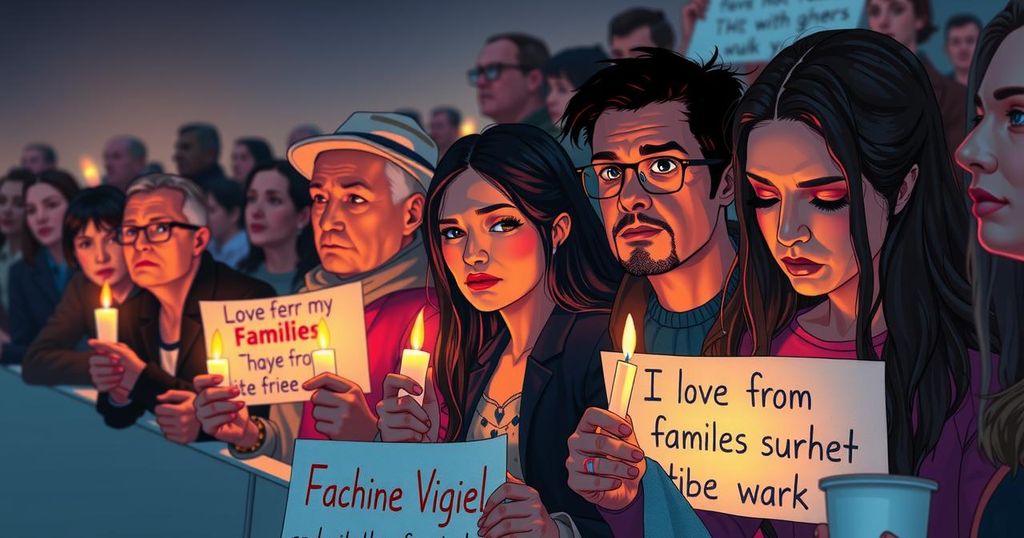Politics
AMNESTY INTERNATIONAL, ANAYEL MIQUELINA, ARAGUA, ASIA, CUBA, DEPORTATION, EL SALVADOR, HUMAN RIGHTS, HUMAN RIGHTS WATCH, JUSTICE, MER, MERVIN YAMARTE, NAY, NAYIB BUKELE, NORTH AMERICA, PHILIPPINES, SOUTH AMERICA, TREN DE ARAGUA, TRUMP, UNITED STATES, VENEZUELA, VIOLENCE, YAMARTE
Nia Simpson
Distress Among Families of Deported Venezuelans Sent to El Salvador Prisons
Families of deported Venezuelan immigrants expressed horror as their loved ones were sent to an infamous mega-prison in El Salvador, wrongly accused of gang affiliations. The Trump administration justified rapid deportations under the Alien Enemies Act, despite many deportees lacking criminal records. The precarious situation raises critical legal and human rights issues, as families protest against wrongful accusations and mistreatment of their relatives, prompting responses from the Venezuelan government. A federal judge has raised questions regarding the legality of these deportations, underscoring the need for scrutiny around immigration policies.
Families of recently deported Venezuelan immigrants express profound anguish and shock upon discovering their loved ones were sent to a notorious mega-prison in El Salvador. The relatives assert their family members do not have any ties to the Venezuelan gang, Tren de Aragua, despite claims utilized by the Trump administration to justify rapid deportations under the historic Alien Enemies Act from 1798. They maintain that their loved ones have been wrongfully accused, primarily due to tattoos.
The families were startled by the unexpected deportation to a massive prison in El Salvador rather than their home country, Venezuela. In a statement from the White House, officials professed confidence in the Department of Homeland Security’s intelligence regarding gang affiliations, reaffirming that the deported Venezuelans had final orders of deportation. The administration emphasized its unwavering commitment to enforcing the rule of law.
Mervin Yamarte’s family was particularly devastated after seeing him in a viral social media video, appearing shackled, while authorities prepared him for transfer to prison. This video, released by Salvadoran President Nayib Bukele, portrayed deported individuals as Venezuelan gang members without sufficient evidence. The Terrorism Confinement Center has garnered criticism for human rights abuses, including overcrowding and torture, substantiated by organizations like Human Rights Watch and Amnesty International.
Anayel Miquelina, Yamarte’s relative, shared the family’s heart-wrenching response to the video. His family was horrified as Yamarte appeared disheveled, which led to panic and despair among his loved ones. The recent deportations were executed under a rarely invoked legal framework, corresponding to wartime scenarios, yet many affected individuals reportedly lack criminal records in the United States.
The family asserts that Yamarte, who is currently involved in an asylum case, has no criminal history and merely possesses tattoos that reflect his admiration for a soccer player and personal milestones. Juan Yamarte, his brother, strongly denounced the accusations linking him to gang activity based solely on tattoo interpretations.
Furthermore, families of others, like Fritzgeralth De Jesus, presented similar narratives of wrongful accusations based on their tattoos. Asserting their relatives have never committed a crime, families reported distress upon learning about their loved ones’ detention and subsequent deportation, leading them to organize protests against the actions taken by immigration officials.
Joseph Giardina, an attorney representing De Jesus, expressed disbelief over his client’s abrupt deportation, questioning the legal processes as the asylum case remained unresolved. García Casique’s mother also voiced concerns for her son’s wellbeing, stressing his lack of any criminal record and demanding his return to Venezuela rather than deportation to El Salvador.
The legality of these deportations is under scrutiny as a federal judge issued a restraining order against the utilization of the Alien Enemies Act for such cases, questioning the protocol surrounding the flights and transfers. In a reaction to these events, the Venezuelan government condemned the treatment of its citizens in El Salvador, urging international attention to the human rights violations that undermine human dignity.
In conclusion, the plight of recently deported Venezuelan immigrants reveals a concerning intersection of immigration policies and human rights. Families of deportees have articulated their distress over allegations linking their loved ones to gang affiliations based mainly on tattoos. With many individuals lacking criminal histories, the utilization of the Alien Enemies Act raises significant legal and ethical questions, prompting protests and calls for accountability. The Venezuelan government has begun denouncing these actions, signaling the urgent need for reforms in the treatment of immigrants. Ultimately, the ongoing developments highlight the broader implications for human rights and due process in immigration law, warranting close attention from both domestic and international communities.
Original Source: www.nbcnews.com








Post Comment